Classic Traditional Thanksgiving Stuffing
on Nov 24, 2019, Updated Jan 18, 2025
This post may contain affiliate links. Please read our disclosure policy.
This is that perfect stuffing that makes Thanksgiving feel like Thanksgiving (and it's vegetarian).
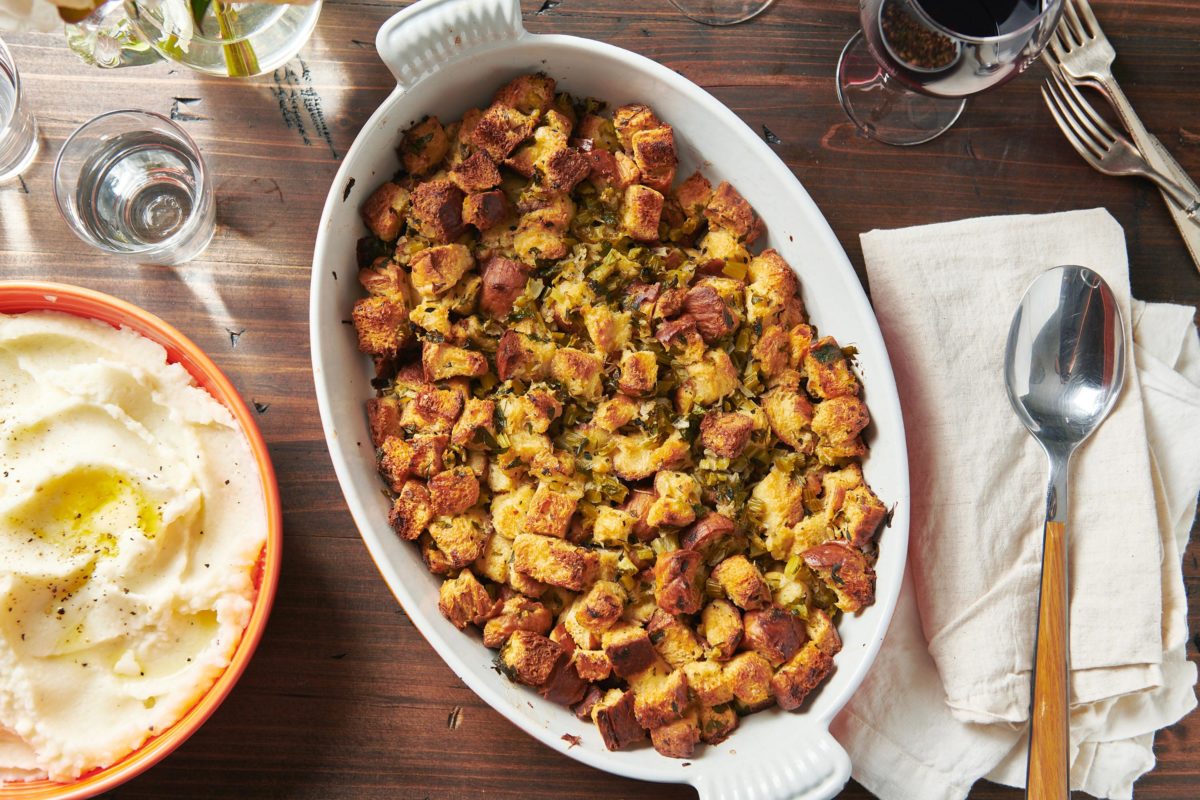
Thanksgiving isn’t Thanksgiving without stuffing. And stuffing (or dressing) is actually amazingly easy to make from scratch. Yes, there are bags upon boxes upon packages of prepared stuffing mixes or dried cubed bread available. But homemade stuffing is so much better than storebought and truly simple to make. This classic Thanksgiving stuffing recipe — pronounced the best stuffing they have ever had by a lot of folks — is so easy to make, and you can make it vegetarian so everyone can enjoy it. I make a pan of both versions every Thanksgiving!
This stuffing is right at home at a traditional Thanksgiving table, with a classic Whole Roasted Turkey, Perfect Mashed Potatoes, and some Cranberry Sauce on the side.
By signing up, you agree to our Privacy Policy.
What's In This Post?
- Stuffing vs. Dressing
- Classic Traditional Thanksgiving Stuffing Ingredients
- Recipe Variations
- What Kind of Bread to Use for Stuffing
- How to Dry Bread for Stuffing
- How to Make Classic Traditional Stuffing for Thanksgiving
- Make Ahead and Storage
- Leftovers and Reheating
- FAQs
- What to Serve With Classic Traditional Stuffing
- More Spoonbread and Stuffing Recipes
- Classic Traditional Thanksgiving Stuffing Recipe
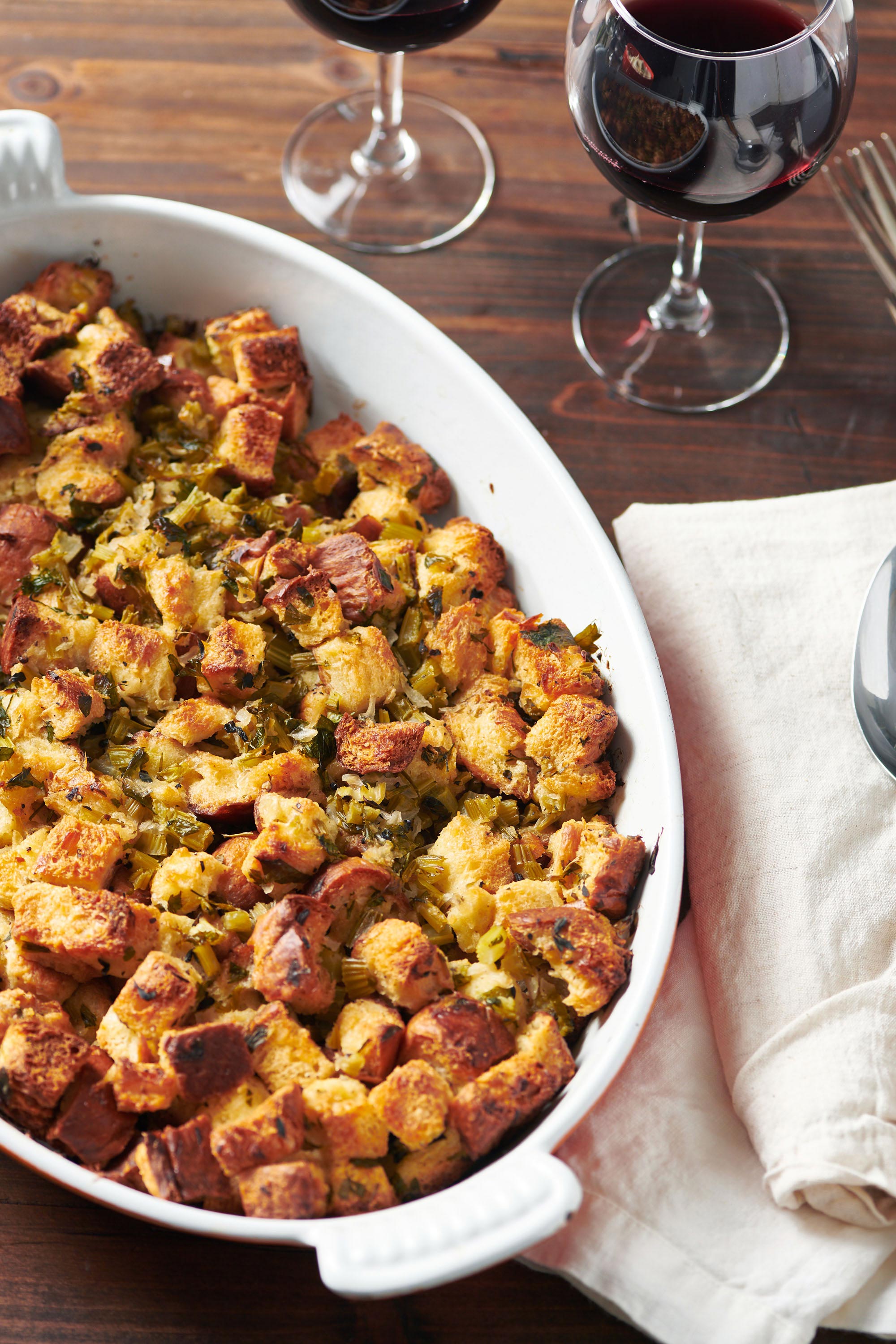
Classic Traditional Thanksgiving Stuffing: This is that perfect stuffing that makes Thanksgiving feel like Thanksgiving (and it can be vegetarian if you like!).
Stuffing vs. Dressing
Whether you refer to this dish as stuffing or dressing probably has to do with what area of the country you hail from. Down South: dressing. Up North: stuffing. But it also has to do with whether you cook it inside the bird or separately in a baking pan or skillet.
Stuffing obviously makes more sense when the mixture is cooked inside the turkey cavity, but it’s still stuffing where I come from, even though it’s always baked in a pan in my house.
Classic Traditional Thanksgiving Stuffing Ingredients
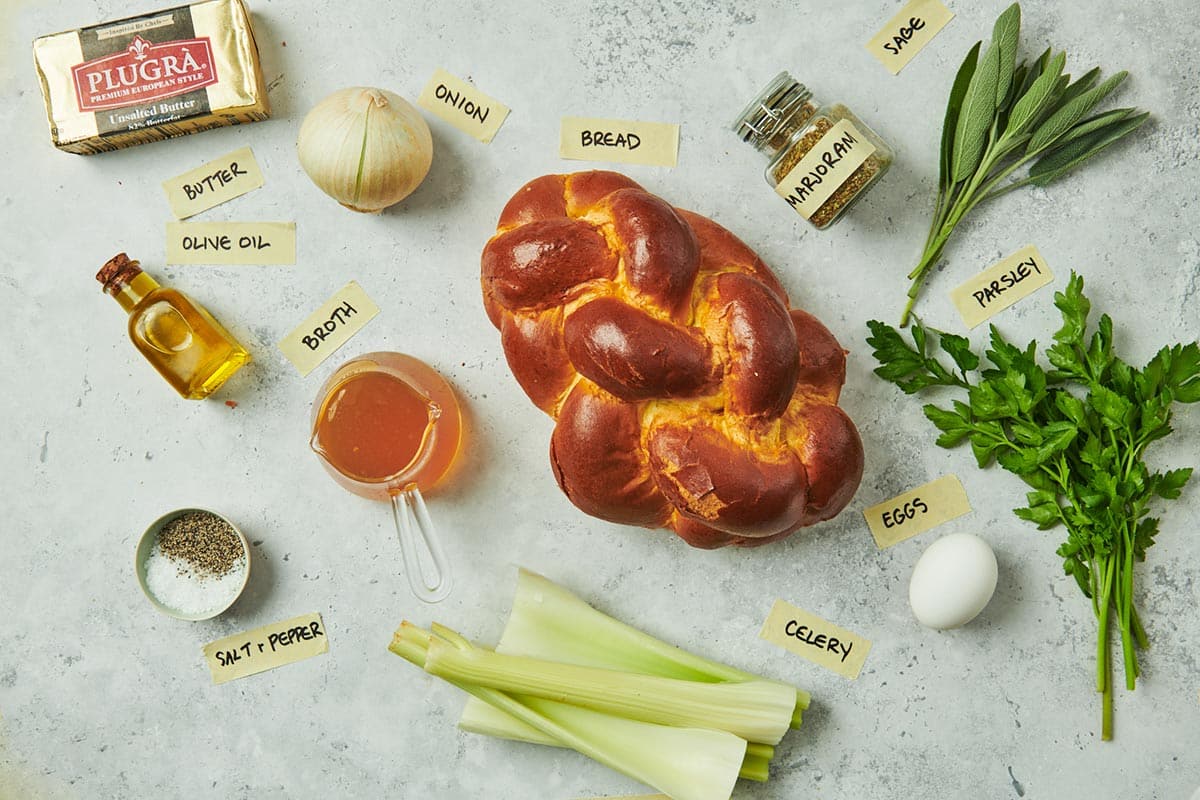
- Unsalted butter – Used to sauté the vegetables before they get incorporated into the stuffing.
- Onion – Gets super soft and sweet.
- Celery – Chop the celery into small pieces to ensure it blends nicely into stuffing.
- Stale bread – You can use any kind of bread you like. I recommend a brioche, challah, or other egg bread because the richness makes the stuffing even more luxurious. See below for how to dry out your bread so your stuffing doesn’t get soggy!
- Sage – You can either use 1 tablespoon of chopped fresh sage or 1 teaspoon of dried sage, as the dried version is more potent.
- Marjoram – Just like the sage, reduce the amount of marjoram if you’re using the dried option.
- Flat-leaf parsley – Adding fresh parsley gives this dish a great pop of color and a fragrant freshness throughout.
- Eggs – The eggs help the stuffing set when cooked, creating an almost custardy texture inside the bread cubes.
- Chicken or vegetable broth – If you have turkey broth, that will work great. Extra points for homemade. Vegetarian broth must be used for vegetarian stuffing.
Recipe Variations
- Vegetarian stuffing: We have a number of vegetarians in the family, so always make the stuffing vegetarian (as well as all of the sides, minus the gravy!). Simply use vegetable broth instead of chicken broth in this recipe, and you’re good to go. Don’t be tempted to add any turkey pan juices! I make a pan of vegetarian stuffing and a separate pan of stuffing with chicken broth and turkey drippings.
- Add-ins: If you want to switch it up, add some more interesting vegetables with the onion and celery at the sautéing stage. I recommend carrots, mushrooms, artichoke hearts, or chopped kale.
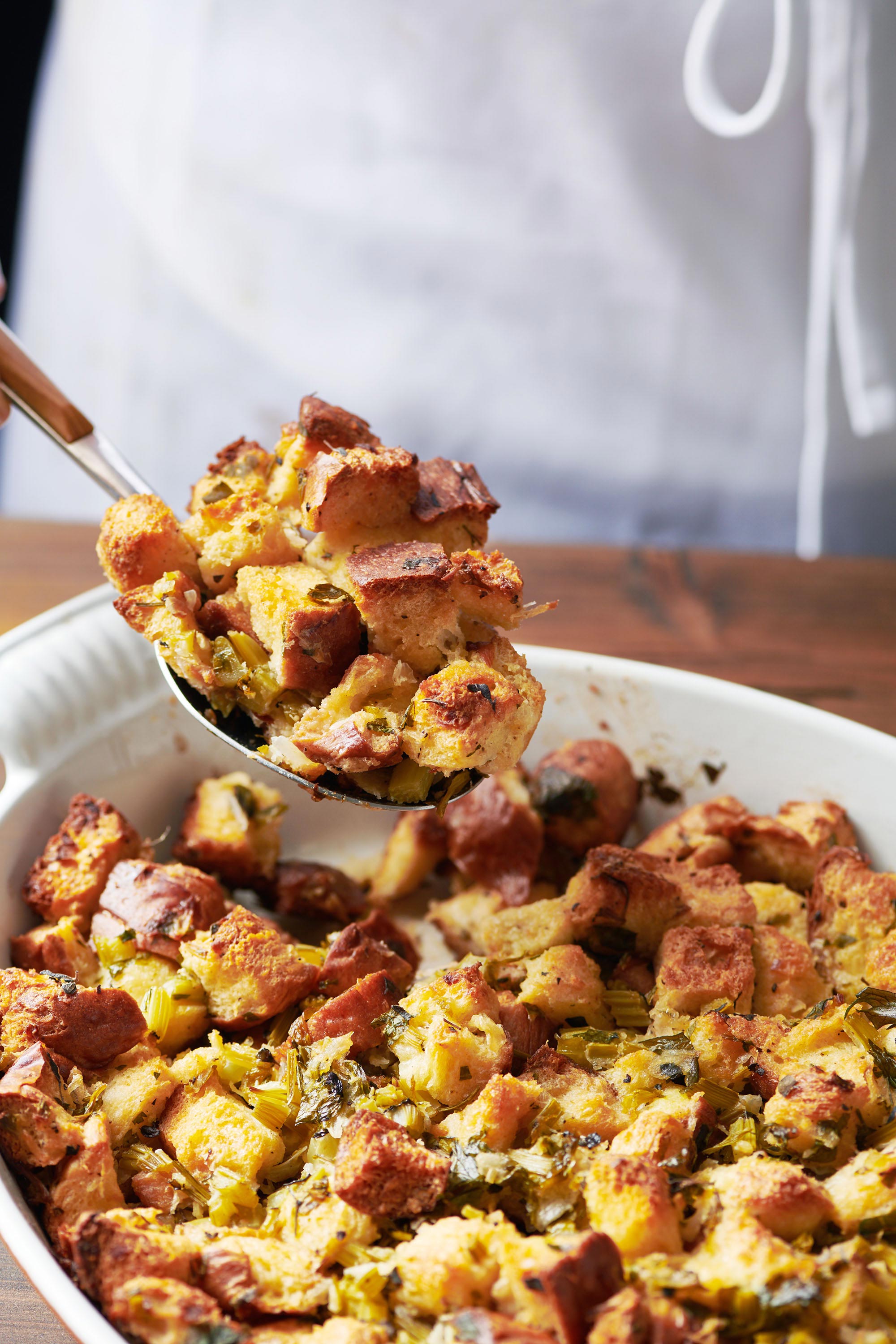
What Kind of Bread to Use for Stuffing
You can use all kinds of bread to make stuffing. Cornbread is one common choice, and here is a recipe for cornbread stuffing. Sometimes, people use a mix of white bread and cornbread, which is delicious. Or you can use a straight-up white bread, like a country white.
Another choice, which is suggested here, is to use an egg-based bread like brioche or challah. Often, these breads are baked and sold in round or oval shapes, but if you are lucky, you will be able to find these egg-based breads in loaf form, which makes it very easy to cut into 1-inch cubes for stuffing.
Make sure the bread cubes are totally dried before proceeding with the recipes. Why? It might seem odd, but once you add the eggs and the broth, fresh bread will turn to mush. You need the heft and texture of the dried bread so the stuffing has height, structure, and a varied consistency. The dry bread can absorb the broth and other moisture without getting soggy, which is what would happen with fresh bread.
Some people do cut the crusts off the bread when they are making stuffing, but I think keeping the crusts adds even more texture to the stuffing, which I love. Also, why would you waste the crust? Food waste, in general, is a *boo* idea, but throwing away those lovely browned, flavorful crusts makes no sense at all.
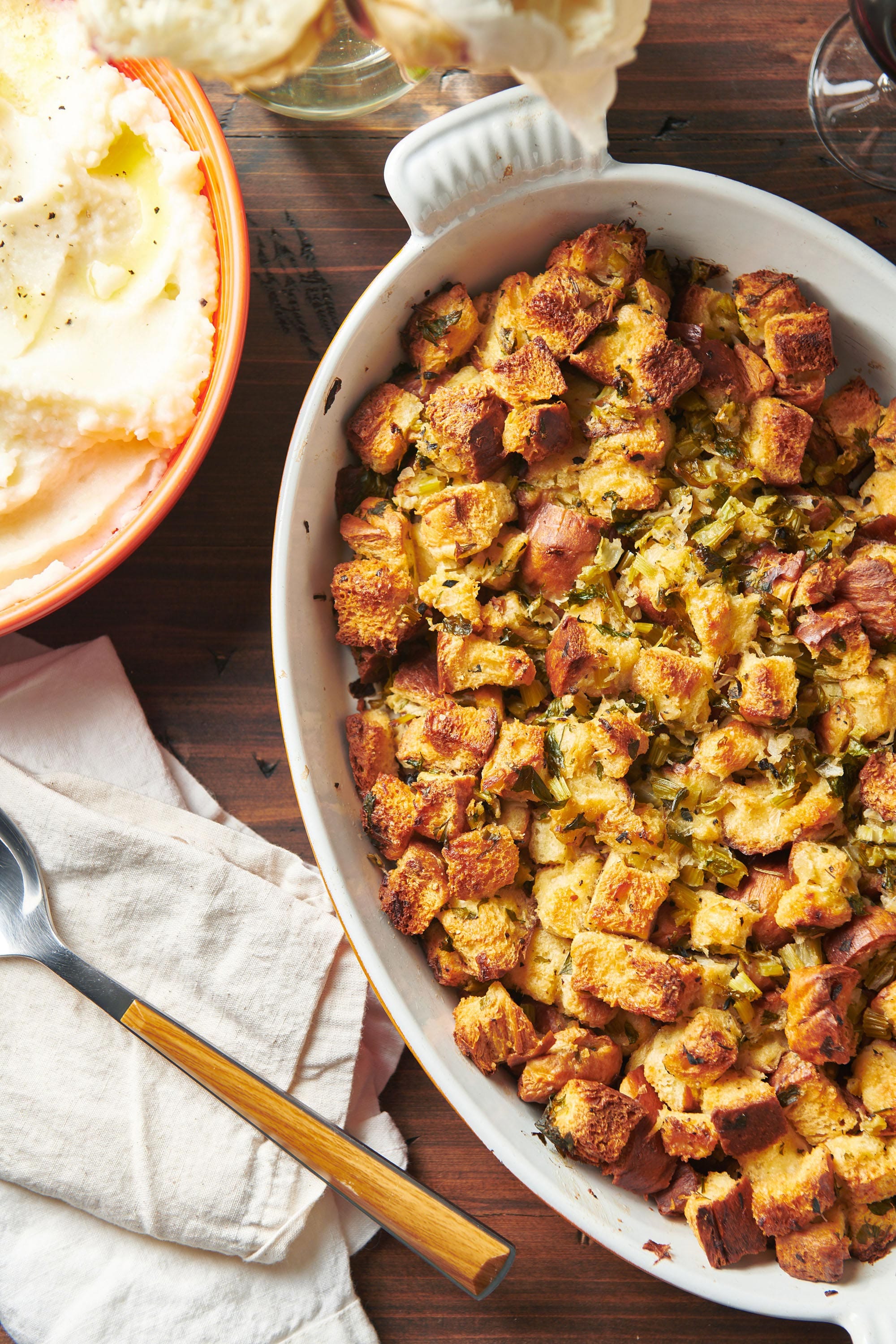
How to Dry Bread for Stuffing
If your bread is already fairly dry, just cut it into cubes and let it sit out, uncovered, on a rimmed baking sheet for 24 hours. If it isn’t dry, you can let it sit out, uncovered, for at least 48 hours, until the cubes are quite dry.
To speed things along, cut the bread into cubes, spread them on a rimmed baking sheet, and bake in a preheated 275-degree oven for about 30 minutes, stirring once or twice as the bread toasts and then spreading it out on the baking sheet so it is as close to a single layer as possible. Let cool completely before proceeding with the recipe.
How to Make Classic Traditional Stuffing for Thanksgiving
- Sauté the vegetables: Preheat the oven to 350 degrees. Sauté the onion and celery in the butter for about 6 minutes until slightly golden and tender.
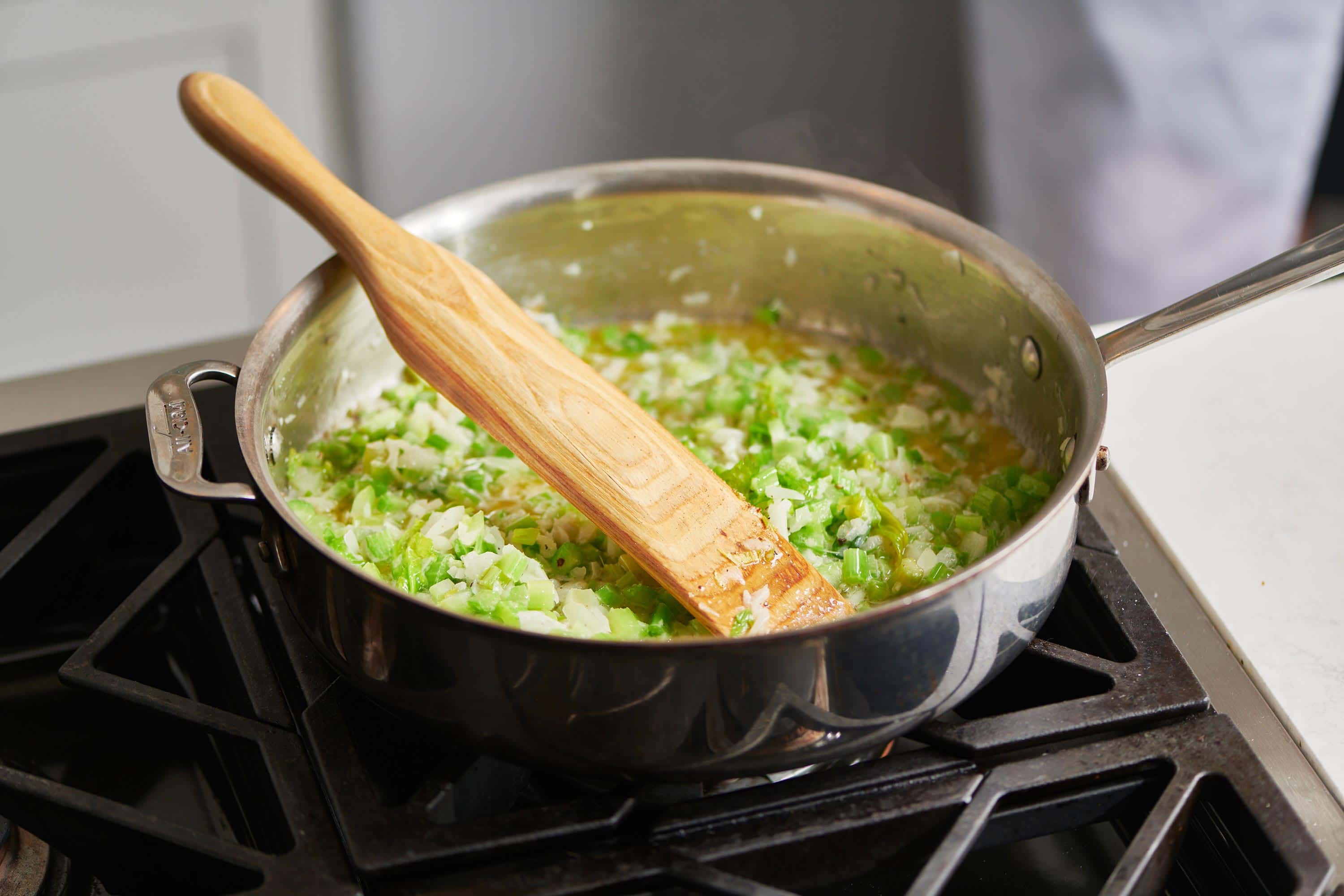
- Combine: Mix together the dried bread cubes and sautéed vegetables.
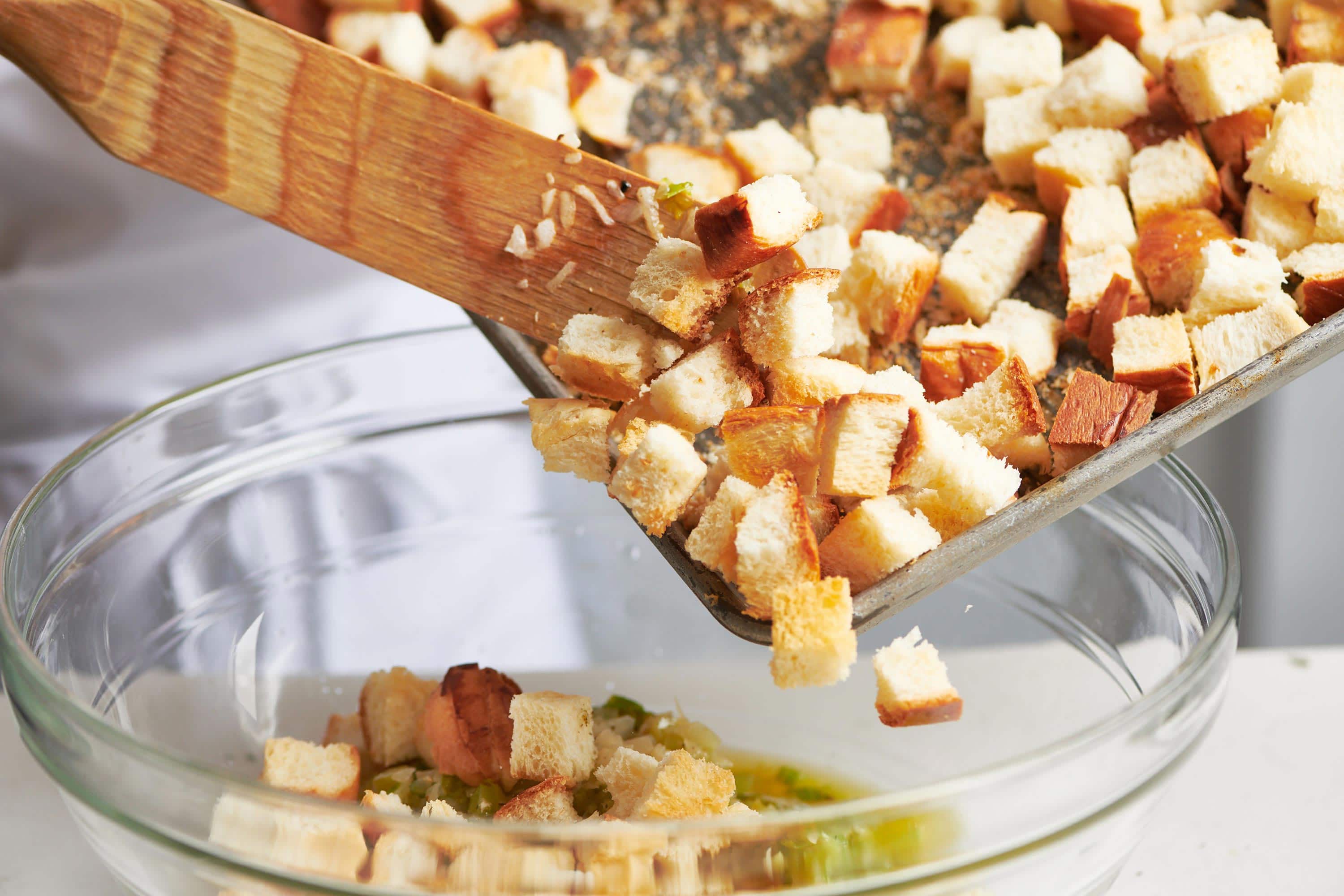
- Season: Add some sage, marjoram, parsley, salt, and pepper and toss to combine well.
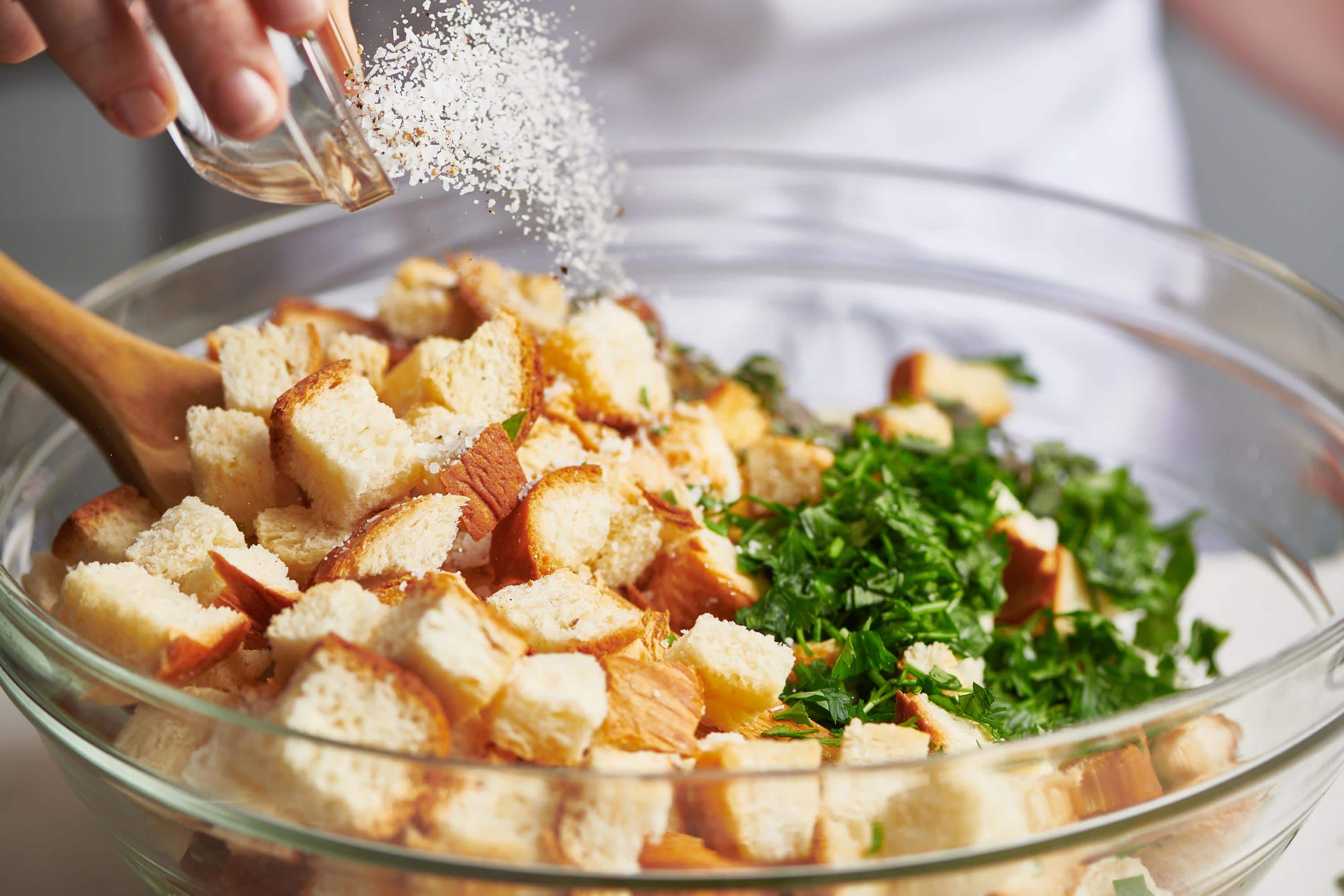
- Prepare the liquid: In another small bowl or measuring cup, beat the eggs with 2 cups of the chicken or vegetable broth. (Use vegetable broth for a vegetarian stuffing!)
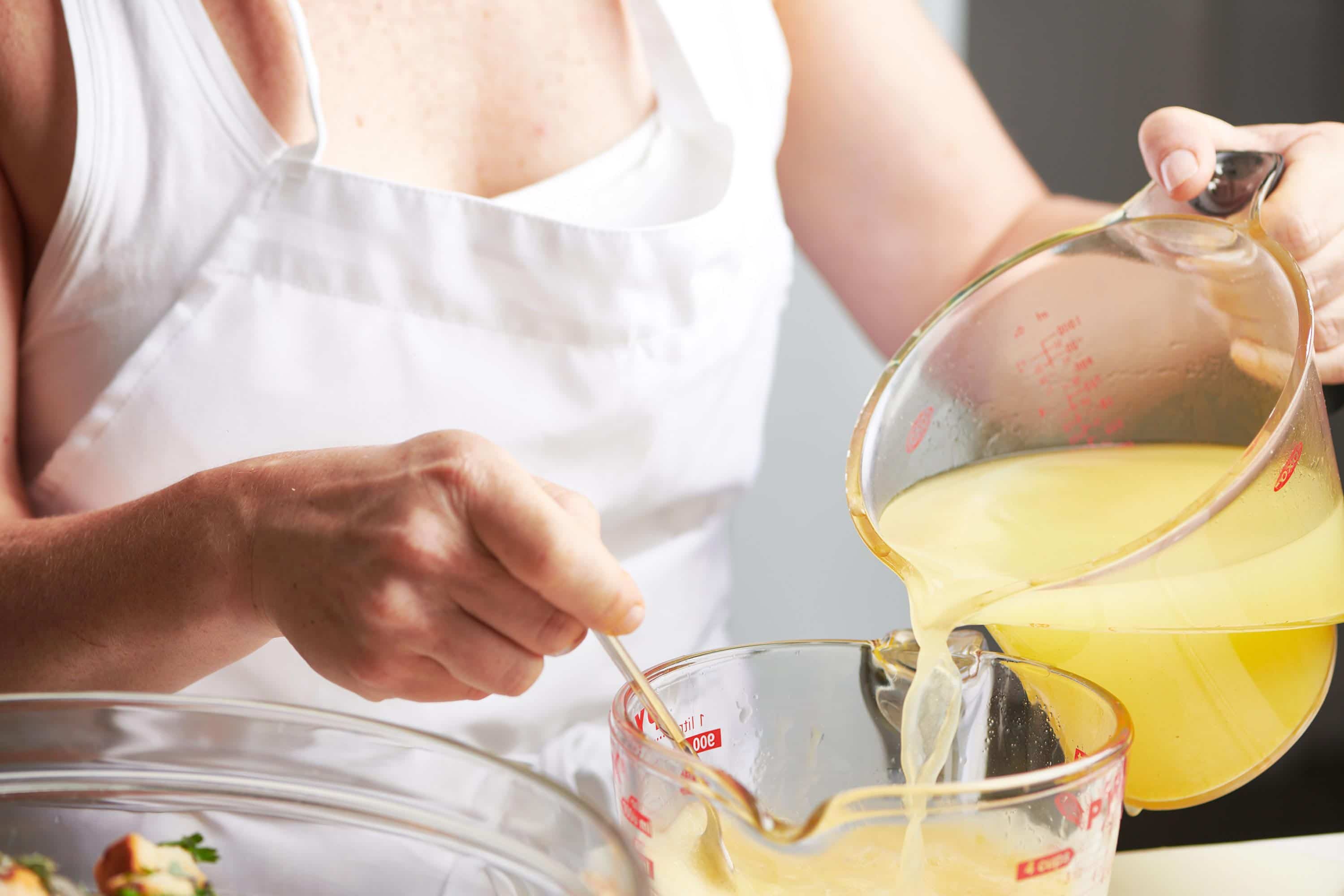
- Add liquid: Drizzle over the broth mixture and toss so that everything is moistened. (Tip: You may need to add another ½ cup broth or so if the mixture seems to be dry in a lot of spots. It should not feel soaked at all.)
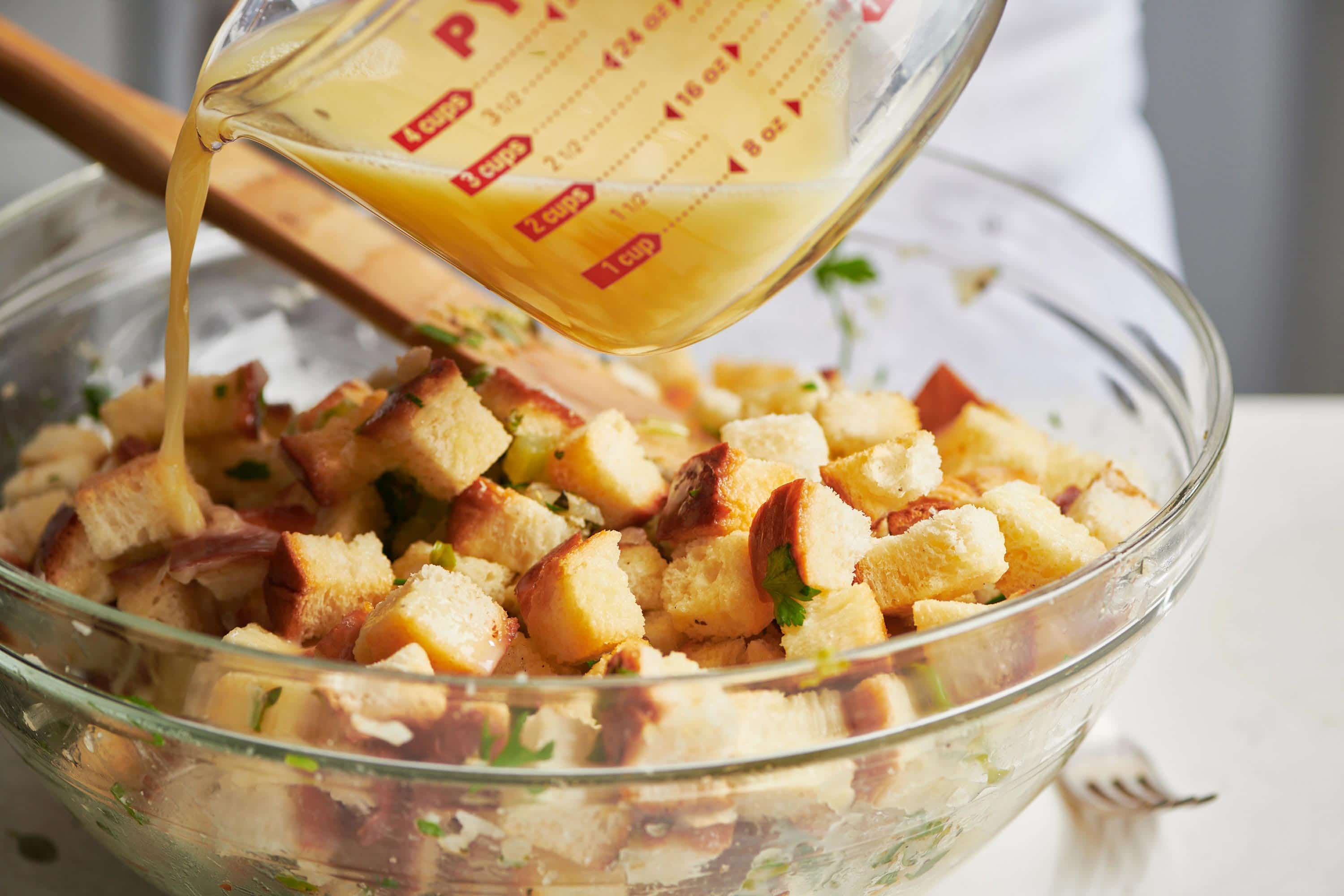
- Place in pan: Turn the mixture into a 2 ½ to 3-quart baking dish or a 13×9 inch baking dish.
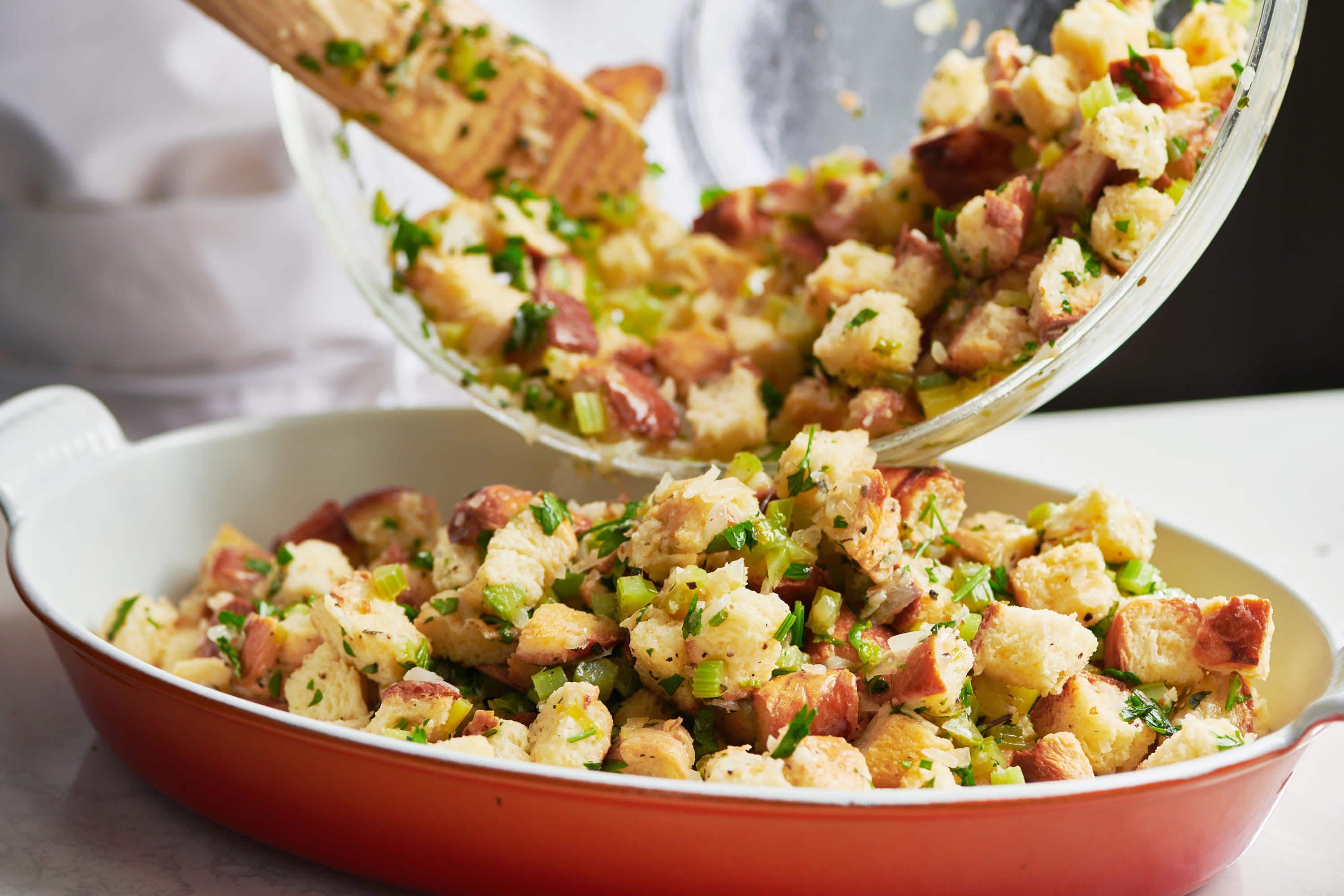
- Bake: Cover the stuffing with foil and bake for 40 minutes. Uncover the stuffing and continue to bake for another 45 minutes or so until the top is slightly crusty and golden brown.
Make Ahead and Storage
Stuffing is a great dish to make ahead of time. You can assemble the whole casserole and cover and refrigerate overnight. Bring to room temperature before baking, or plan to add 15 minutes to the first part of the baking time with the casserole covered.
Or, if you prefer, you can cook the vegetables and store them in a container in the fridge. Then, just before baking, mix together the broth and egg, combine all of the components (egg mixture, bread cubes, and vegetables), transfer to the casserole, and stick it in the oven to bake.
Leftovers and Reheating
Leftovers will last for up to 4 days in the fridge. They can be reheated in the microwave, though the top won’t crisp up again. You can also reheat leftover stuffing in a 350-degree oven for about 20 minutes, uncovered.
FAQs
Yes, it is possible to make your stuffing vegan. Just use vegetable broth instead of chicken or turkey broth, and leave out the eggs. You may have to add an extra ⅔ cup of broth to make up for the liquid that has been lost.
Yes, dried herbs can be used in stuffing. I recommend fresh herbs because they are the main seasonings of the dish and can bring so much freshness. Dried herbs are even more concentrated in flavor, though, so choose whatever works for you.
Yes! It can be refrigerated for a day and then baked just before serving.
If you want to cook your stuffing inside the bird, you should definitely follow the FDA’s guidelines about how to do that safely.
Baking your stuffing separately is the safest route to go, but if you really want to stuff the turkey, follow these tips:
1. The bird must be stuffed right before going into the oven.
2. Don’t pack in the stuffing — it should be loosely stuffed. Figure about ¾ cup stuffing for each pound of turkey.
3. The stuffing should reach 165 degrees F at the deepest part of the cavity, measured with an instant-read thermometer. Removing the turkey before the stuffing reaches that safe temperature could allow bacteria to form in the stuffing, so that’s the concern with stuffing the turkey.
What to Serve With Classic Traditional Stuffing
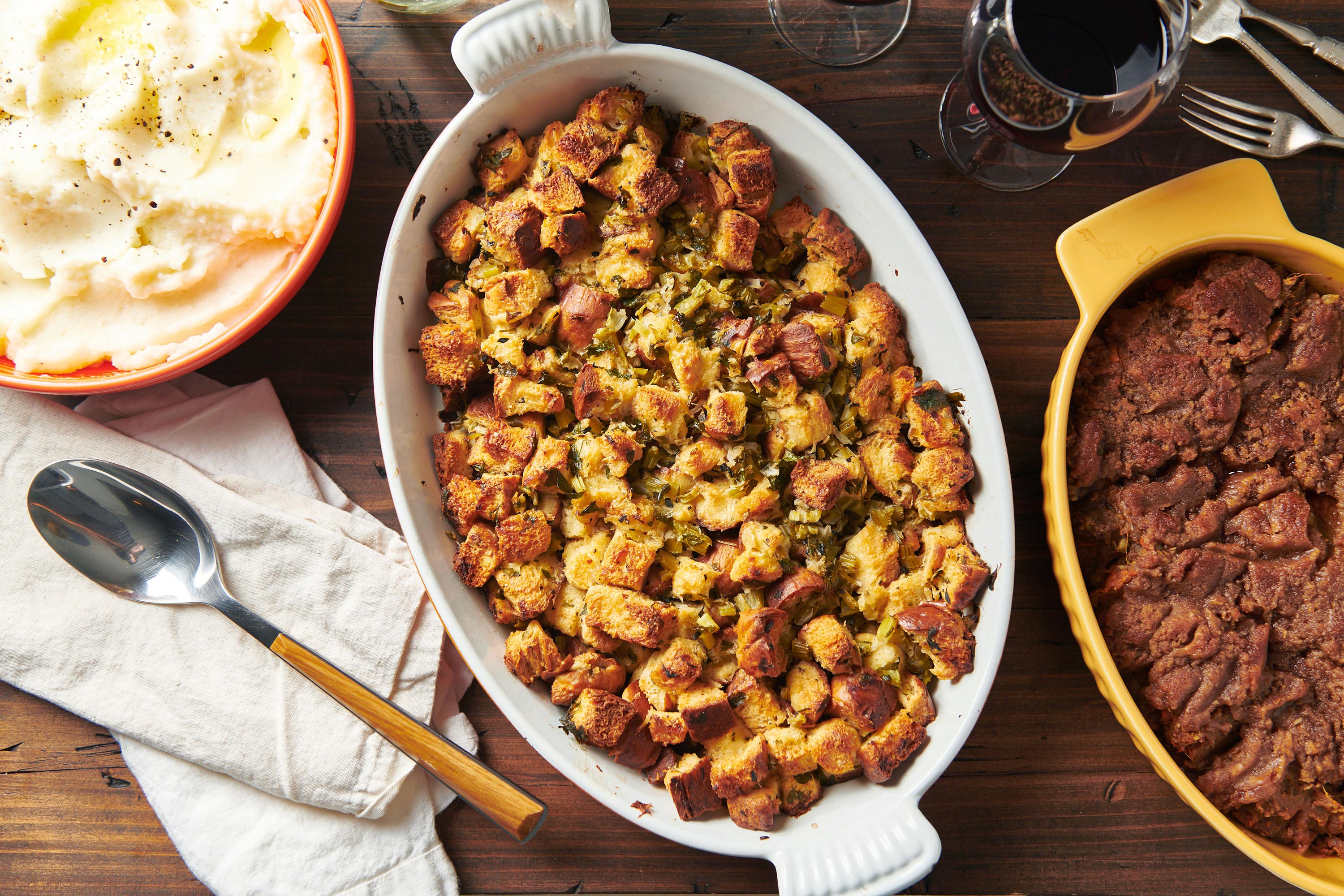
More Spoonbread and Stuffing Recipes
- Cornbread and Mushroom Stuffing
- Bread Stuffing with Turkey Sausage
- Sweet Potato Spoonbread
- Spoonbread Corn Pudding
Pin this now to find it later
Pin It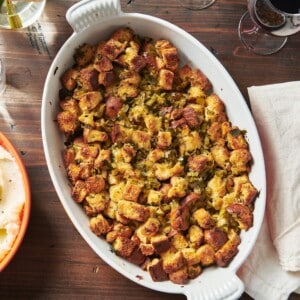
Classic Traditional Thanksgiving Stuffing
Video
Ingredients
- ¾ cup (1 ½ sticks) unsalted butter
- 1 large onion (chopped)
- 2 cups chopped celery
- 1 loaf (18 to 20 ounce) brioche (or challah or other egg bread, or a country white bread; cut into 1-inch cubes; 10 to 12 cups; see Note about drying bread)
- 1 tablespoon chopped fresh sage (or 1 teaspoon dried)
- 1 tablespoon chopped fresh marjoram (or 1 teaspoon dried)
- ½ cup chopped fresh flat-leaf parsley
- 1 teaspoon kosher salt
- ½ teaspoon freshly ground black pepper
- 2 large eggs
- 2 cups chicken or vegetable broth (preferably low sodium; or more as needed)
Instructions
- Preheat the oven to 350 F.
- Melt the butter in a medium skillet over medium heat. Add the onion and celery and cook, stirring occasionally, for about 6 minutes until the vegetables are slightly golden and tender.
- Remove the onion and celery from the heat and turn into the bowl. Add the dried bread cubes (see Note!), sage, marjoram, parsley, salt, and pepper and toss to combine well. In another small bowl, beat the eggs with 2 cups of the broth (use vegetable broth for a vegetarian stuffing). Drizzle over the broth mixture and toss so that everything is moistened. You may need to add another ½ cup broth or so if the mixture seems to be dry in a lot of spots. It should not feel soaked at all.
- Turn the mixture into a 2 ½ to 3-quart baking dish or a 13×9 inch baking dish. Cover the stuffing with foil and bake for 40 minutes. Uncover the stuffing and continue to bake for another 45 minutes or so until the top is slightly crusty and golden brown.

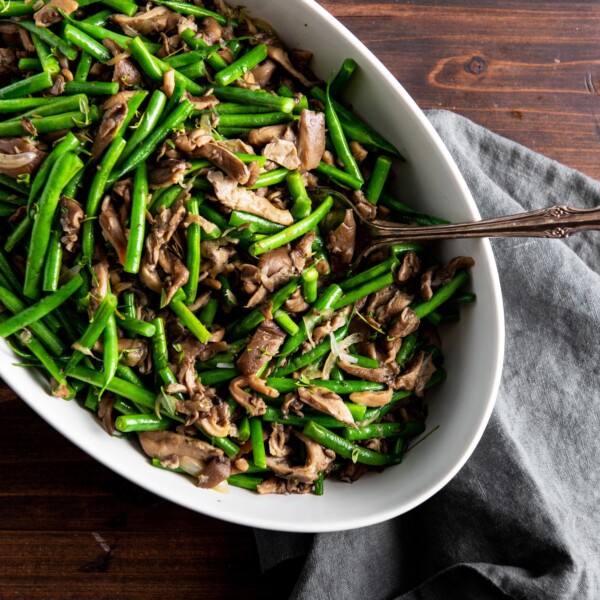
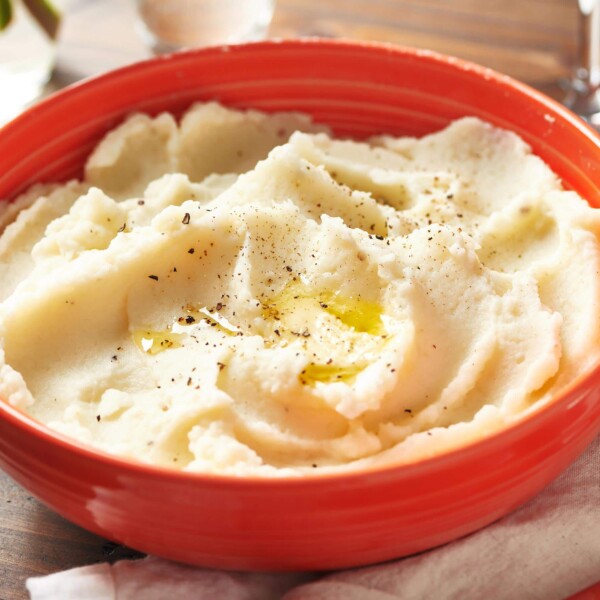

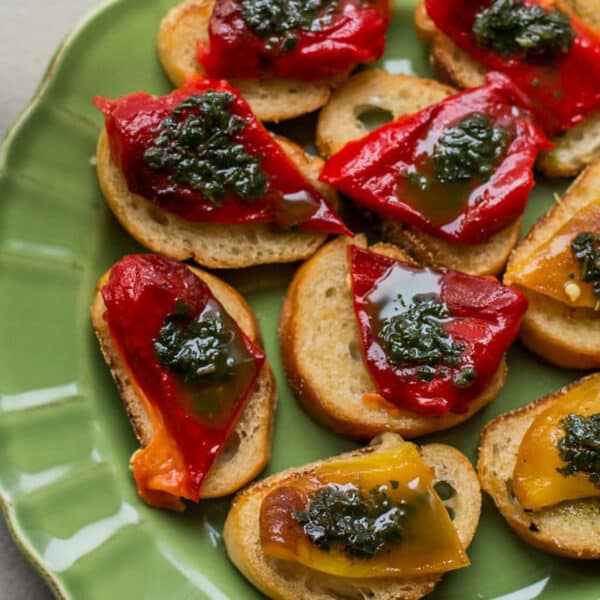
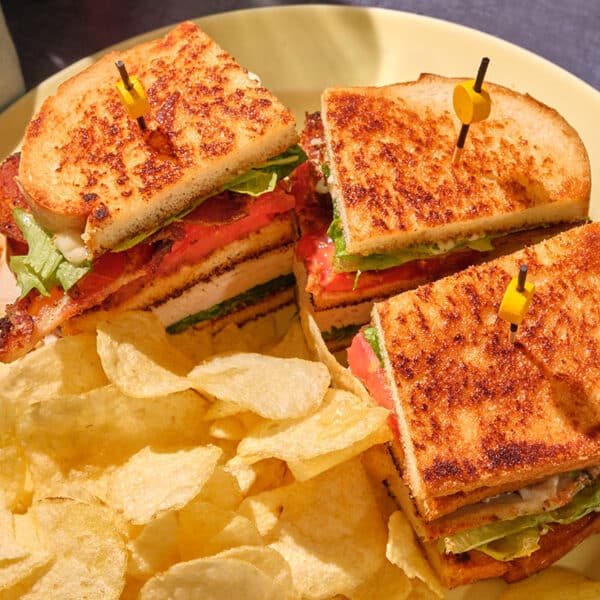
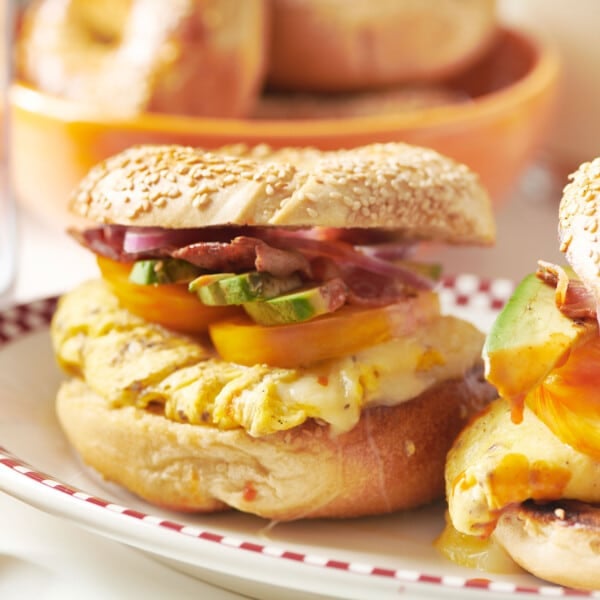









How far in advance can you make this?
you can make it a day ahead, and then bake it. I prefer to combine all of the components right before baking, but you coule dry the bread crumbs, saute the vegetables, and have the liquid ready to go, then mix it up in the pan and bake. or bake it ahead, and gently reheat it in a low oven until hot when ready to serve.
I checked out your recipe for cornbread stuffing but my family doesn’t care for mushrooms. I like the sound of this one but want to know if it would still work if I used cornbread in it instead of white bread? Thanks.
sure! or try this one! https://themom100.com/recipe/classic-traditional-thanksgiving-stuffing/